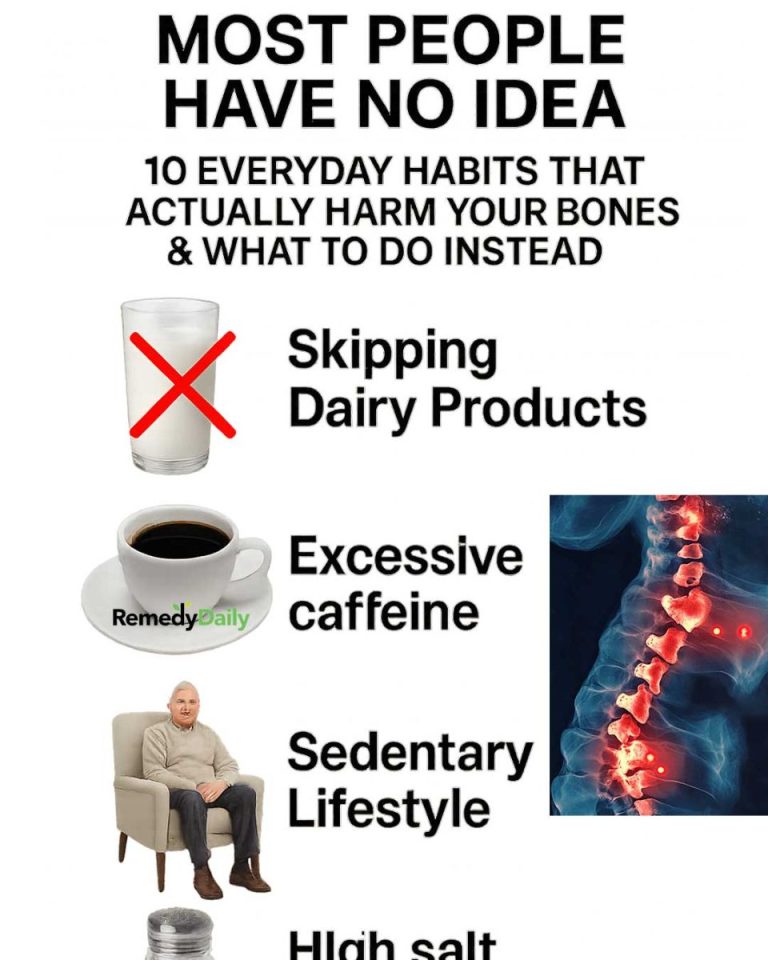Most people have no idea. 10 everyday habits that actually harm your bones & what to do instead

Habit 1: Skipping Dairy Products
Dairy products are rich in calcium, a mineral essential for bone health. Many people avoid dairy due to lactose intolerance or dietary preferences, missing out on this crucial nutrient. Instead, consider lactose-free dairy options or fortified plant-based alternatives like almond or soy milk. Incorporating other calcium-rich foods such as leafy greens, almonds, and tofu can also help meet daily calcium needs.
Habit 2: Consuming Excessive Caffeine
While a morning cup of coffee is a staple for many, excessive caffeine intake can interfere with calcium absorption, weakening bones over time. It's important to moderate caffeine consumption and balance it with calcium-rich foods. Opt for decaffeinated beverages or herbal teas, and ensure you're getting enough calcium to counteract any potential negative effects.
Habit 3: Smoking and Its Impact on Bone Density
Smoking has a detrimental effect on bone health, reducing bone density and increasing the risk of fractures. The toxins in cigarettes interfere with the body's ability to absorb calcium, leading to weaker bones. Quitting smoking is one of the best steps you can take to improve bone health, alongside adopting a diet rich in calcium and vitamin D.
Habit 4: Leading a Sedentary Lifestyle
Physical activity is crucial for maintaining bone density. A sedentary lifestyle can lead to bone loss and increased fracture risk. Incorporating regular weight-bearing exercises such as walking, jogging, or resistance training can help strengthen bones. Aim for at least 150 minutes of moderate-intensity exercise per week to support bone health.
Habit 5: Excessive Alcohol Consumption
Drinking too much alcohol can interfere with the balance of calcium in the body and affect bone density. Alcohol can also disrupt the production of hormones that are important for bone health. Limiting alcohol intake to moderate levels—up to one drink per day for women and two for men—can help protect your bones.
Habit 6: High Salt Intake
A diet high in salt can cause the body to lose calcium, leading to weaker bones. Processed foods are often high in sodium, so it's important to read labels and choose low-sodium options. Reducing salt intake and eating a balanced diet rich in fruits, vegetables, and whole grains can help maintain bone health.
Habit 7: Not Getting Enough Sunlight
Sunlight is a natural source of vitamin D, which is crucial for calcium absorption and bone health. Lack of sunlight exposure can lead to vitamin D deficiency, weakening bones. Aim to spend 10-30 minutes in the sun several times a week, or consider vitamin D supplements if you live in an area with limited sunlight.
Habit 8: Over-reliance on Processed Foods
Processed foods often lack essential nutrients needed for bone health, such as calcium and vitamin D. They can also be high in sodium and unhealthy fats. Focus on a diet rich in whole foods, including fruits, vegetables, lean proteins, and whole grains, to provide the nutrients necessary for strong bones.
Habit 9: Neglecting Weight-Bearing Exercises
Weight-bearing exercises are essential for stimulating bone growth and maintaining bone density. Activities like walking, dancing, and strength training apply pressure to bones, encouraging them to strengthen. Incorporate a variety of exercises into your routine to target different bone groups and enhance overall bone health.
Habit 10: Ignoring Calcium and Vitamin D Intake
Calcium and vitamin D are critical for bone health. Many people fail to get the recommended daily amounts, leading to weakened bones. Ensure you're consuming enough calcium through dairy, leafy greens, and fortified foods, and consider vitamin D supplements if necessary. Regularly check your levels with a healthcare provider to adjust your intake as needed.